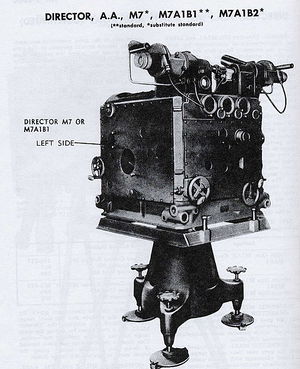Category:Cybernetics: Difference between revisions
From ETHW
No edit summary |
No edit summary |
||
| Line 2: | Line 2: | ||
The [[IEEE Systems, Man, and Cybernetics Society History|IEEE Systems, Man, and Cybernetics Society]] represents IEEE's interests in the cybernetics field and publishes journals and holds conferences. | The [[IEEE Systems, Man, and Cybernetics Society History|IEEE Systems, Man, and Cybernetics Society]] represents IEEE's interests in the cybernetics field and publishes journals and holds conferences. | ||
[[Image: Cybernetics_Anti_Aircraft_Trajectory_ Predictor.jpg|thumb|right|A photo of The M7 Anti Aircraft Trajectory Predictor]] | |||
== Subcategories == | == Subcategories == | ||
| Line 13: | Line 16: | ||
*'''[[:Category:Intelligent control|Intelligent control]]''' - control techniques that use artificial intelligence computing approaches | *'''[[:Category:Intelligent control|Intelligent control]]''' - control techniques that use artificial intelligence computing approaches | ||
*'''[[:Category:Linear feedback control systems|Linear feedback control systems]]''' - systems that attempt to regulate a variable at a stable setpoint or reference value using feedback, contrasted with logic or sequential control systems | *'''[[:Category:Linear feedback control systems|Linear feedback control systems]]''' - systems that attempt to regulate a variable at a stable setpoint or reference value using feedback, contrasted with logic or sequential control systems | ||
[[Category:Automation|{{PAGENAME}}]] | [[Category:Automation|{{PAGENAME}}]] | ||
Revision as of 01:09, 7 January 2012
Cybernetics encompasses the development of systems engineering technology including problem definition methods, modeling, and simulation, methods of system experimentation, human factors engineering, data and methods, systems design techniques and test and evaluation methods.
The IEEE Systems, Man, and Cybernetics Society represents IEEE's interests in the cybernetics field and publishes journals and holds conferences.
Subcategories
- Adaptive systems - interdependent entities that form an integrated whole yet are able to respond to changes in environmental conditions or interrelated parts of the whole
- Cognitive science - the study of mental processes and the mind
- Control theory - an interdisciplinary branch of engineering and mathematics that deals with dynamic systems and the use of controllers to manipulate inputs for a desired output
- Decision theory - a theory interested in demonstrating the values and uncertainties inherent in decisions and the potential "optimal decision"
- Econophysics - the use of theories and methods originally used in physics to solve economic problems
- Emergent phenomena - complex systems and entities that arise out of simpler entities and interactions
- Intelligent control - control techniques that use artificial intelligence computing approaches
- Linear feedback control systems - systems that attempt to regulate a variable at a stable setpoint or reference value using feedback, contrasted with logic or sequential control systems
Pages in category "Cybernetics"
The following 10 pages are in this category, out of 10 total.
